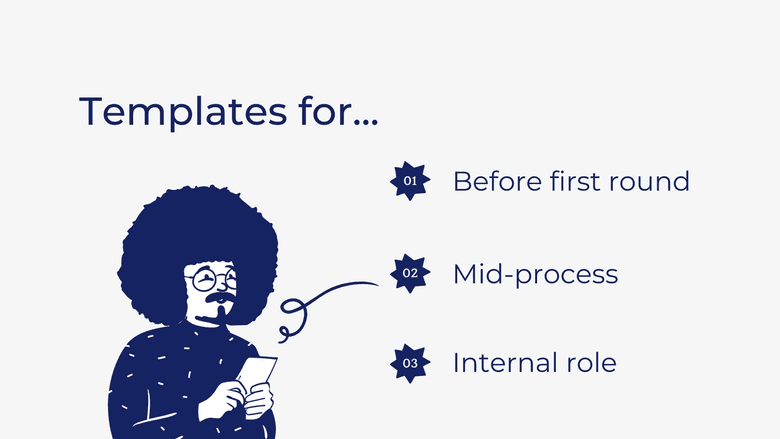Should you turn down a job interview? Templates and tips
When and why you should decline is just as important as how to write the email gracefully.
You received an interview invitation for a position you aren't interested in.
Maybe this is the first time a recruiter is reaching out, or maybe you are already going through the interview process but had a change of heart. Either way, you want to address the invitation in a respectful way and leave the door open for future opportunities or communications.
Regardless of your reasoning and stage in the process, here are some tips (and templates) to turn down an interview simply and professionally.
5 Tips for Turning Down an Interview Respectfully
1. Consider it carefully

The decision to turn down an interview is final: once you send that email, you shouldn't change your mind. If you do, you may seem unreliable, indecisive, or inconsiderate, qualities no one wants in an employee.
Before you send the email, you should...
- Take a few hours to think it over. Consider the company, the position, and whether you may be a good fit (even if you were deterred initially).
- Understand why the invitation doesn't appeal to you. Does the company have an aggressive culture, or a reputation for mistreating employees? Are you content with your current job or a new job elsewhere? Or are you simply anxious about the prospect of an interview? Some reasons are more valid than others.
- Remember that an interview is not a massive commitment. It's not as though you're considering a job offer. Rather, you are taking the opportunity to learn about a new company and/or position, and improve your interview skills in the process. Especially if you are in the midst of a job search, accepting an interview opportunity can only benefit you!
2. Know who to tell

The first person you should tell is your primary contact within the organization. This is likely the recruiter, or a representative from human resources who has guided you through the process.
If you are already a few interviews in, you should also reach out to the hiring manager, interviewers, or anyone else who has helped you significantly. Send them separate messages thanking them for their support and informing them about the situation.
3. Be courteous and cautious

Your language should be respectful and express appreciation for the opportunity. You want to avoid burning bridges, for the sake of professionalism and the possibility of future opportunities.
However, you also want to be careful about just how much you reveal. You don't need to provide an in-depth explanation of why you're passing on the interview-- they don't want to know that other job opportunities interest you more. If you officially signed an offer elsewhere, you can disclose that if you wish.
4. Respond quickly

Respect the company's time and understand that, by waiting until the last minute to cancel, you could disrupt their hiring process. If possible, respond as soon as you make your decision. Recruiters will appreciate your promptness and you will come across as reliable and professional.
5. Follow up

If you do not hear back with a confirmation that your message was received, be sure to follow up. This can be done via a brief email, or a phone call to your primary contact. If they don't answer, leave a voice mail. The call/voicemail should either
- Repeat the content of your original email, or
- Request that they confirm receiving your message from X date, and state that you would be happy to resend it if not.
We recommend you go with option (a), but understand that everyone's comfort with phone conversations varies.
3 Scenarios & Corresponding Email Templates

Declining before the first interview...
Interview Invitation for (X Position)
Dear (Contact Name),
Thank you for extending an invitation to interview for (Job Title) at (Company Name). I greatly appreciate the opportunity!
However, I regret to inform you that I must withdraw my application at this time. (If you've accepted another offer, you can say so here).
Optional paragraph: Although I may not be the right fit for this position, my colleague (Colleague's Name) would make an excellent candidate. They can be reached at (their preferred contact method) and their LinkedIn profile can be found here (attach link), if you'd like to learn more.
Please confirm the receipt of this message as soon as you can. Thank you again for your consideration. I wish you the best of luck in finding the right candidate!
Kind regards,
(Your Name)
Declining in the midst of the process...
Following up
Dear (Contact Name),
Thank you for extending a (second round, final round, etc) interview invitation for (Job Title) at (Company Name). I have loved learning about your organization and meeting some wonderful people in the process.
However, I regret to inform you that I must withdraw my application at this time. (If you've accepted another offer, you can say so here).
Optional paragraph: Although I may not be the right fit for this position, my colleague (Colleague's Name) would make an excellent candidate. They can be reached at (their preferred contact method) and their LinkedIn profile can be found here (attach link), if you'd like to learn more.
Thank you again for considering me and I appreciate the kindness you have shown throughout this process. Please confirm the receipt of this message when you can and, in the meantime, I wish you the best of luck in finding the right candidate!
Best regards,
(Your Name)
Declining an interview for an internal role...
Following up on your offer to interview
Dear (Contact Name),
Thank you for extending an invitation to interview for (Job Title). I appreciate the opportunity to explore another role within the company!
However, I regret to inform you that I will not be moving forward with the interview process at this time.
Optional paragraph: If you have not yet considered them for the position, my colleague (Colleague's Name) would make an excellent candidate. They can be reached at (their preferred contact method) and their LinkedIn profile can be found here (attach link), if you aren't familiar with their background.
Please confirm the receipt of this message when you can. Thank you again for considering me and I hope we can stay in touch about future opportunities. In the meantime, I wish you the best of luck in finding the right candidate!
Kind regards,
(Your Name)
The information provided herein is for general informational purposes only and is not intended to provide tax, legal, or investment advice and should not be construed as an offer to sell, a solicitation of an offer to buy, or a recommendation of any security by Candor, its employees and affiliates, or any third-party. Any expressions of opinion or assumptions are for illustrative purposes only and are subject to change without notice. Past performance is not a guarantee of future results and the opinions presented herein should not be viewed as an indicator of future performance. Investing in securities involves risk. Loss of principal is possible.
Third-party data has been obtained from sources we believe to be reliable; however, its accuracy, completeness, or reliability cannot be guaranteed. Candor does not receive compensation to promote or discuss any particular Company; however, Candor, its employees and affiliates, and/or its clients may hold positions in securities of the Companies discussed.
